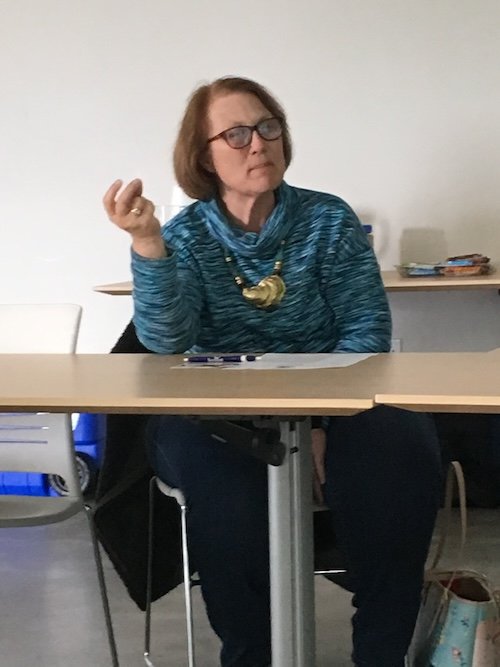Janet Rose Takes a Stand
Reprinted rom Tradewinds Magazine, 2018, B. Garrity-Blake; photograph by B. Garrity-Blake
“Since I’ve been on the Marine Fisheries Commission,” reflected Janet Rose of Moyock, NC, “I’ve had the feeling that I’m just warming a seat. Decisions are made before we come around the table.”
Ms. Rose, born and raised on Knotts Island, was appointed in 2015 to one of three seats representing commercial fishing interests. The MFC is composed of nine members appointed by the Governor. In addition to the three commercial seats, there are three recreational fishing representatives, two “at large” seats, and one scientist.
The makeup of the Marine Fisheries Commission was enacted as part of the 1997 Fisheries Reform Act, and is designed to maintain balance among stakeholders in the management of public trust fisheries resources.
“But the current commission is lopsided,” Janet Rose stressed. “Someone who had served in a recreational seat was put in an at-large seat, and an at-large person was put in a recreational seat. Your thoughts don’t change with a switch in seats.”
Ms. Rose maintains that the at-large seat should be filled by citizens who care about maintaining healthy fisheries resources, such as community leaders or seafood consumers.
“There should be a give and take on this commission, with everyone working for the resource,” she added. “But now, recreational interests have the vote. No matter what I say, or fishermen, consumers, fisheries staff, or what the data says – they have the vote to do what they want.”
Complaints about the imbalance and actions of the current commission has compelled the Deputy Secretary of the Department of Environmental Quality to attend recent MFC meetings, an unusual step in the history of North Carolina governance.
Janet Rose is a retired school teacher, and is no stranger to public service. She formerly served on the North Carolina Coastal Resources Commission.
“The Coastal Resources Commission functioned like a group of concerned citizens,” she said. “The Marine Fisheries Commission is the only commission that has these problems. And this is a powerful commission – they can make rules that affect a lot of people. I mean a lot of people.”
Ms. Rose explained that not only were working families impacted by decisions of the commission, but so too were the countless consumers of North Carolina seafood. “We have to remember the consumer who enjoys fresh seafood. They don’t have a boat – they have to rely on commercial fishermen.”
“I’m in that situation right now,” she added. “My father was a fisherman, and then of course my late husband Paul was a fisherman. But I don’t fish – I’m a real estate agent!”
Her husband Paul Rose was not only a commercial fisherman. He was also a member of the Marine Fisheries Commission, and served as chairman until he died of a heart attack in 2014 when he was only 52.
“Paul had been to the doctor with chest discomfort,” Janet recalled. “The doctor said it was reflux. But two days later my twelve-year-old daughter and I walked in the house and found him. The autopsy showed four blockages.”
Did she think the stress of serving as Chair of the MFC contribute to his heart attack? “I’m sure it didn’t help,” she said. “He got a lot of phone calls. So I wanted to serve because my late husband served and he was a hard worker who knew his stuff – a smart fisherman, and a good husband, father, and provider.”
Janet Rose is tough in her own right, raised by a hardy stock of coastal islanders. Both sets of grandparents ran hunting and fishing lodges on Knotts Island.
“My grandmothers were both widowed at a young age and supported themselves through their lodges. So I know about recreational fishing, and enjoyed fishing recreationally growing up. Then I married a commercial fisherman - I know how hard they work, I know the issues they face.”
In 1999 the couple opened Paul Rose Seafood. “I was the person that did the marketing,” she explained. “I’d come home from teaching and have 300 bushels of crabs in the cooler to sell. I’d get on the phone – that was when trucks were coming down from the Chesapeake Bay, begging.”
She stressed the importance of economic diversification in commercial fishing.
“Don’t put all your eggs in one basket!”
Harvesting a variety of fisheries in any given year has been a hallmark of survival for North Carolina fishermen, and many turn to shore side work to supplement their income during off-season weeks or months. But this strategy has become harder with increased restrictions and other factors, some tied directly to the problem of an imbalanced Marine Fisheries Commission.
“The shrimp petition really bothered me,” she emphasized, referring to a petition for rulemaking submitted by the North Carolina Wildlife Federation and Southern Environmental Law Center just ahead of the MFC meeting in February of 2017. The petition called for reclassifying most coastal fishing waters, from estuarine to three miles offshore, as “special secondary nursery areas”, and proposed additional limits on shrimp trawling to reduce bycatch.
“We had staff from Marine Fisheries who had been working collaboratively with fishermen on trawlers to reduce bycatch,” she noted, a three-year, tax-payer funded process which would be undermined by the petition.
Despite the ongoing bycatch reduction study, overwhelming public and advisory committee opposition to the petition, and staff data that showed critical flaws in the proposal, the Marine Fisheries Commission voted to grant the petition 5 – 3 with one abstention. The petition is now under review by the state, and can be adopted into rule by the MFC as early as 2018 year unless killed by the legislature.
“Again, recreational interests on the MFC have the votes to get what they want.”
The recent motion made at the February 2018 meeting to “define a commercial fisherman” bothered Janet Rose as well. Not only would the proposed changes cut out a substantial number of commercial fishing license holders unable to meet the new criteria, it would also reduce license revenue that helps pay for federally-required sea turtle observer coverage.
“Next we’ll hear that DMF doesn’t have the money to pay for turtle observers,” she remarked. “I feel many decisions are made by this commission with the idea of getting rid of gillnets in the back of their minds.”
The proposal to redefine a commercial fisherman was met with great opposition at the public hearing. Worse, Ms. Rose pointed out, the motion that was debated by commissioners the next morning bore little resemblance to the language which was advertised for public comment.
“The motion was based on outside interests – we didn’t even discuss the findings of a committee that was formed to look at the issue,” Janet Rose said. A newly appointed MFC member filling the scientist seat made the motion, stating that the language came from the North Carolina Wildlife Federation and tweaked by himself and a couple of other members of the commission.
“This led me to wonder if they’d discussed the motion before the meeting, which is a violation of ethics,” she said. “We all have to take an online ethics training every two years, and we’ve learned that discussing business outside of the meeting is a violation.”
In 2016 a state audit found that NC Marine Fisheries Commission members violated the open meetings law, requiring deliberations to be public, on four occasions.
The motion to change the licensing structure and redefine a commercial fisherman passed 5-4, despite caveats by legal counsel. Because licensing policy is set by statute as part of the Fisheries Reform Act, the changes must be approved by the General Assembly.
“That’s why I made the motion I did,” said Ms. Rose. She was so troubled by the vote to change the licensing criteria, and the way that process unfolded, she moved that the commission send a request to the Governor asking that he examine the current commission’s membership and, if need be, make changes to ensure it functions as intended.
“I thought it would die for lack of a second,” she exclaimed. “One of our new members – in a recreational seat - gave us a second, which was amazing!” The motion passed 5-4. “I couldn’t believe it passed,” she added.
“I thought, let’s give Governor Cooper a shot at it.”
Her hope is that the Governor will take measures to restore the balance as intended and required by the Fisheries Reform Act, for the benefit of the resources and all stakeholders including seafood consumers. One thing is for sure: Janet Rose is not afraid to take a stand, and she is doing her late husband proud.
“I do appreciate our commercial fishermen,” she said. “And I do enjoy fresh, local seafood.”

